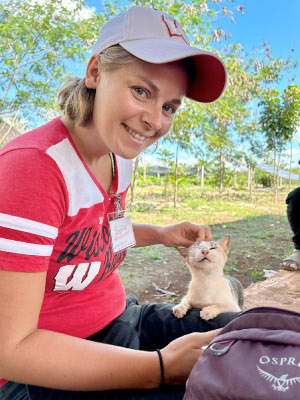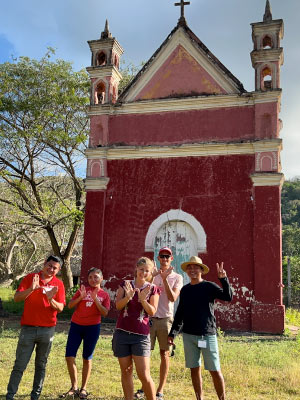
Nelson Institute environment and resources PhD student Sophia Winkler-Schor has spent most of her life fascinated with both the environment and Latin America. As a Fulbright-Hays Doctoral Dissertation Research Abroad (DDRA) Fellow, Winkler-Schor has been conducting her PhD research in Mérida, the capital of Yucatán Mexico since August of 2022, where she focuses on a large national government program called Sembrando Vida (or “Sowing Life”).
Sembrando Vida pays farmers to implement agroforestry and sustainable agriculture across the country. The program is unique in its structure and design; it is one of the only existing programs to be fully funded by a large government and compensates participants for adopting sustainable farming practices.
Working in cohorts, participants learn sustainable farming practices such as making composts and natural fertilizers, then get to bring the new practices to their own land. Because the practices they’re learning are innovative, participants get paid a living wage to take part in the program, benefiting both participants and the land around them.
“Traditional farming practices in the area are not as successful as they used to be due to rising temperatures and rain pattern variation,” Winkler-Schor said. “So, the hope is that changing up farming practices with new ones that are outside of the traditional scope will help lead farmers to more success on their land.”
Winker-Schor interviews participants in the program as part of her research to understand what the long-term implications of the program are. She seeks to answer the question, “Do payment programs, in any capacity, have long-term implications outside of the payment period?” She looks at what psychological factors influence participation and what motivates them to continue engaging in the sustainable practices they learn in the program.
“There’s very limited research on the long-term implications of payment programs within conservation … To my knowledge, there has never been a program that pays people full-time minimum wages to dedicate themselves to sustainable agriculture,” Winkler-Schor said. “With 450,000 participants, this is an expensive program, and participants feel like the government really values agriculture because of it.”
The program also fosters better social belonging. Winkler-Schor noted that many men have to leave their communities in search of work in new cities or even countries, so the government aims to pay people enough to stay in their communities for work.
“In some ways, you could say this program is also a reclamation of the social fabric of these communities,” Winker-Schor said. “There are a lot of potential benefits within the program, extending from conservation to social factors.”
Winkler-Schor was excited about the opportunity to integrate her interest in food with her PhD research. “I was really excited about this program because it’s the first project where I’m really integrating agroforestry and food production,” Winkler-Schor said. “My biggest side passion is cooking, and I love gardening, so it’s been interesting to learn more about agriculture. It’s always been a tangential topic I learn about through my education, but this is an amazing opportunity to integrate my passions within my research.”

Winkler-Schor noted that engaging with participants in interviews has been one of her favorite parts of her research, as participants are both extremely knowledgeable and excited to share their experiences.
“Most people here are really passionate and excited about agriculture, and I am equally excited to learn about it,” she said. “I’ve also gotten to try so many cool types of food from interviewing participants that are generous and allow me to try their crops.”
“I really like the interviews because they give participants an opportunity to share how they think and feel the program is going,” Winkler-Schor added. “The program is hard work and the reporting they are asked about from the government is usually only sharing quantitative data about their crops, so participants are excited to talk about their challenges and successes in these interviews.”
As a side project, Winkler-Schor has been learning Maya, the native language of Yucatán, for the past three and a half years.
“It’s been really fun to share cultural communication and experiences in these interviews through speaking Maya,” she said. “Not many people still speak it, and it means a lot to native speakers when they are able to connect through it.”
Winkler-Schor found her way to the Nelson Institute after long and hard research of different PhD programs. She was drawn to the Nelson Institute for the flexibility offered by the program, as she was looking to integrate environmental studies and psychology in a meaningful way with ample resources available to her.
“Conservation psychology is a fairly new field, and many PhD programs do not have an interdisciplinary nature about what it means to study environmental studies,” Winkler-Schor said. “Nelson had a program that not only offered me the option to study environmental studies in tandem with psychology, but also had people available to assist me with that connection.”
Learn more about the environment and resources MS/PhD and how you can support the program.